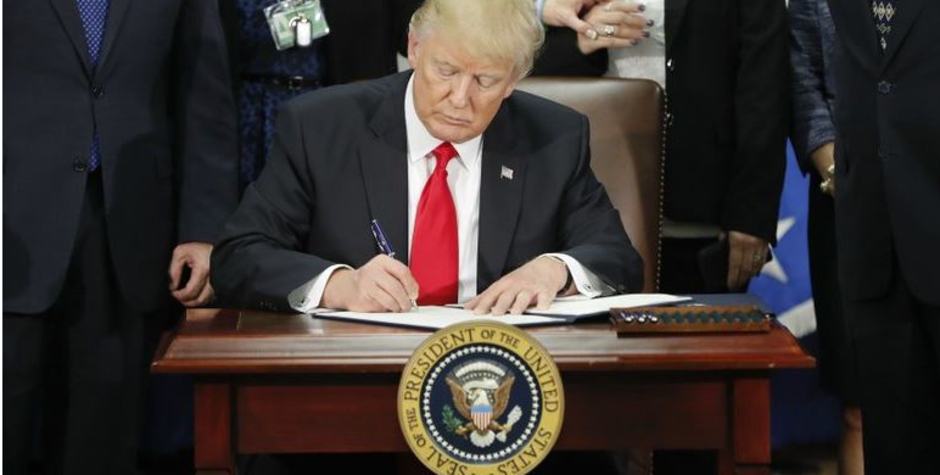Everything You Need to Know about Judge’s Hold on President Trump’s Executive Order
In a move with legal reasoning as spurious as it is sparse, this past week, a federal judge in Washington state issued a temporary restraining order (TRO) putting a hold on President Trump’s January 27, 2017 Executive Order, which was designed to protect the United States from foreign terrorists who desire entry into the United States.
The federal district judge’s order contravenes legal procedure, the considered judgment of Congress that the President should have unreviewable authority to suspend the admission of any class of aliens, and constitutional provisions granting the Executive branch authority to control the admission of refugees and aliens into the United States.
According to Kennedy v. Mendoza, 372 U.S. 144, 160 (1963), the Supreme Court held that United States Constitution is “not a suicide pact.” The first responsibility of the United States government is national defense, not political correctness. President Trump’s Executive Order is closely tethered to discretionary powers vested in the Executive Branch that clearly and unmistakably fall within the President’s well-established constitutional and statutory authority.
President Trump’s Executive Order is designed to “protect the American people from terrorist attacks by foreign nationals admitted to the United States.” Consistent with this goal, the Order pauses the entry of immigrants and refugees from certain unstable and terrorism-infested countries in order to permit federal authorities to improve our outdated immigration and refugee screening process.
Notwithstanding this clearly articulated purpose and despite the fact that the order does not ban Muslim immigrants and refugees because they are Muslim, the judge issued a temporary restraining order requested by the States of Washington and Minnesota. The Court’s order was issued on flimsy legal grounds.
First, the order contains virtually no legal analysis. This type of relief sought by the plaintiffs is known throughout the federal Circuits as “extraordinary” relief, which cannot be granted lightly. Indeed, such an extraordinary order by a federal court requires convincing legal analysis. Second, as a predicate to granting a TRO, the court had to find that the plaintiffs have shown a high likelihood of success on the merits of its claims. Third, the court had to find, that there is a high likelihood that the plaintiffs will suffer irreparable harm.
The judge’s decision fails on all counts.
The judge failed to apply the law to the facts. Second, he assumed, without any evidence, that the plaintiffs have demonstrated that there is a high probability that they would prevail on the merits. Third, he cannot show how the plaintiffs suffered any harm whatsoever.
The judge did not even cite a statute that President Trump’s Executive Order allegedly violated. Moreover, the Court failed to cite an article of the Constitution the Executive Order allegedly violated.
It is manifest that aliens seeking initial admission to the United States request a privilege, and therefore they have no constitutional rights regarding their applications for admission because it is the sovereign prerogative of the government to deny admission. Landon v Plasencia, 459 U.S. 23, 32 (1982).
Acting within his constitutional and statutory power, President Trump issued an Executive Order that clearly withstands scrutiny.
The plaintiff states and the Trump Administration are rapidly filing briefs in district and appellate court regarding the constitutionality of the Executive Order. The stay of the temporary restraining order could reach the Supreme Court later this week. In the meantime, the case on the merits of the lawsuit continues to move forward in district court, in addition to the numerous other lawsuits filed around the country.
As this case quickly winds its way through the judicial system and possibly reaches the Supreme Court soon, the ACLJ is preparing emergency briefs to defend the U.S. Constitution, U.S. statutory law, and the powers granted to the Executive Branch therein.
To that end, we have just filed an amicus brief at the 9th Circuit court of Appeals. In it we explain the failed reasoning of the trial court and outline statutory law, constitutional provisions, and judicial precedent clearly upholding President Trump’s lawful exercise of Executive authority.
As we explained in our brief:
There can be no doubt that Congress expressly delegated to the President broad discretionary authority: Whenever the President “finds that the entry of any aliens or of any class of aliens into the United States would be detrimental to the interests of the United States,” the President has the authority to “suspend the entry of all aliens or any class of aliens as immigrants or nonimmigrants, or impose on the entry of aliens any restrictions he may deem to be appropriate.” 8 U.S.C. § 1182(f).
The express delegation of powers by Congress is but part of the equation. The United States Constitution grants to the President inherent foreign affairs and national security powers. U.S. Const. Article II; Harisiades v. Shaughnessy, 342 U.S. 580, 588 (1952) (recognizing that immigration control is an integral part of Article II authorities “in regard to the conduct of foreign relations [and] the war power”).
Specifically, we made two points: 1) the Executive order was well within the constitutional limits of the President’s immigration and national security powers and 2) that the provision prioritizing Christian and other religious minority victims of jihadist genocide has congressional moorings in the statutes establishing our refugee programs.
We concluded:
The directives contained in the President’s Executive Order are closely tethered to discretionary powers vested in the Executive Branch by the Constitution and Congress and clearly fall within the President’s well-established constitutional and statutory authority.
As we continue to file critical legal briefs in these cases, please join us by signing our petition below.
